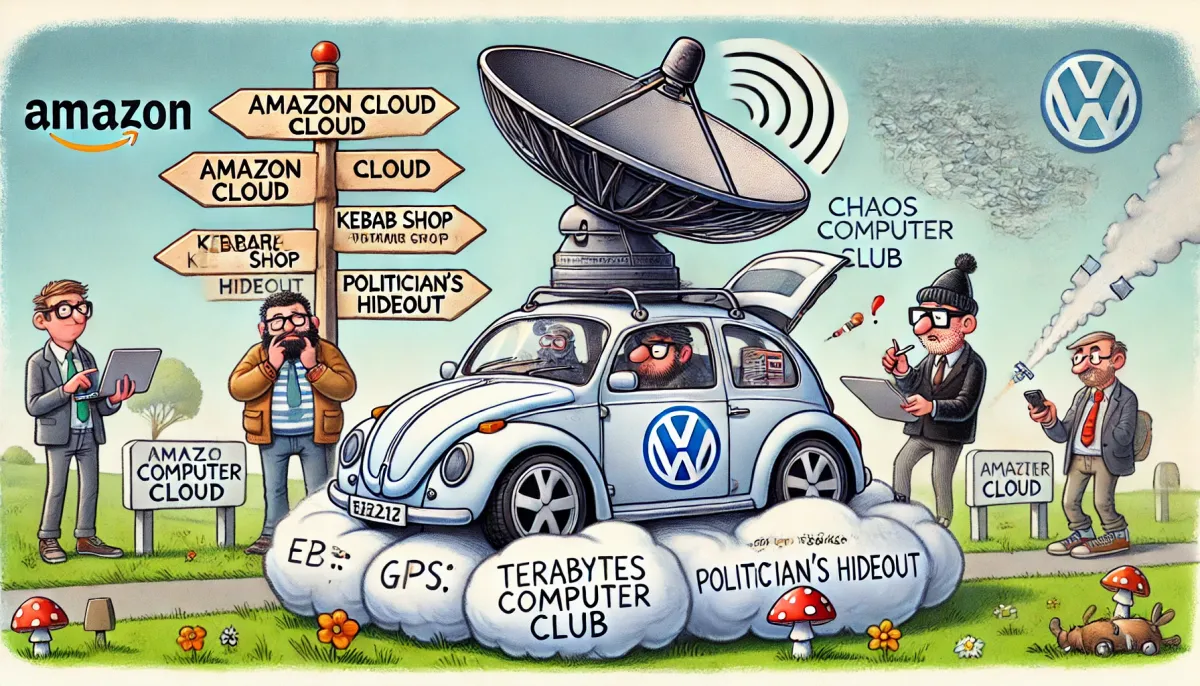The Exposed Data Debacle: Volkswagen's Unintended Masterclass in Digital Transparency

n the annals of modern automotive engineering, where electric cars are heralded as the saviors of our carbon-conscious souls, Volkswagen has inadvertently added a new feature to its offerings: hyper-precise surveillance. Forget adaptive cruise control; meet "adaptive exposé control," courtesy of Cariad, Volkswagen’s automotive software arm. It’s the kind of unintentional hilarity that makes you wonder if life is secretly scripted by a darkly comedic novelist.
It all began when Cariad left terabytes of data—including the location of nearly 800,000 electric cars—parked wide open on Amazon cloud storage. Think of it as a digital valet who, instead of safeguarding your car keys, yells, "Hey, everyone! Over here!"
The Chaos Computer Club (CCC), Europe’s ethical hacker equivalent of neighborhood watch, spotted this blunder. They promptly informed Volkswagen, which reacted quickly—because nothing motivates a corporate entity quite like the prospect of a privacy scandal involving half a million coordinates pinpointed to within ten centimeters. (Side note: do Audi owners feel slightly superior knowing their data was off by a luxurious ten kilometers instead?)
The Precision Problem
You might ask, Why does any car company need to know your car’s location with the precision of a military-grade missile system? Cariad assures us it’s for "smart, digital, and personalized functions." Translation: “We’ll know exactly where you are so we can sell you stuff you didn’t ask for while improving battery charging software you don’t understand.”
Apparently, this data also benefits humanity—or at least the humanity that overlaps with Volkswagen customers. For instance, anonymized charging habits will help develop better batteries. What this means is anyone’s guess, but it sounds futuristic enough to quiet skeptics.
The Whistleblower Who Went Full GPS
The CCC hackers were tipped off by a whistleblower, whose identity remains as shrouded in mystery as the whereabouts of your actual car might have been. They tested the breach, only to find that Volkswagen had gift-wrapped access keys in a memory dump from an internal Cariad application. A memory dump! The name itself sounds like something you’d delete without a second thought, yet it held the keys to a treasure trove of driver data.
Once inside, the CCC discovered location details for police patrol cars, suspected intelligence operatives, and even two German politicians. This raises an obvious question: Are these the people you want to track? A Hamburg police car sitting idle next to a kebab shop might be a public interest story, but it’s hardly lucrative intel.
Privacy in the Digital Fast Lane
Volkswagen was quick to reassure its customers that the exposed data did not compromise car controls—just the drivers’ dignity. In the grand tradition of corporate spin, Cariad pointed out that the breach was merely a "configuration error." This is like saying, “Sorry, your house burned down. We accidentally stored matches next to a fireworks display.”
And while they tout pseudonymization—because nothing screams "security" like slapping a fake name on sensitive data—the reality is more sobering. With freely available software, journalists were able to trace this anonymized data back to real people. Apparently, the "pseudo" in pseudonymization is doing a lot of heavy lifting.
Lessons in Oversharing
What’s the moral of this story? For starters, maybe stop collecting data with the enthusiasm of a toddler hoarding Halloween candy. Yes, personalization is nice, but nobody asked for an electric car that doubles as Big Brother’s understudy.
Second, if you're going to store data in the cloud, maybe don’t make it so accessible that even a teenager with a Raspberry Pi could stumble into your database.
Finally, perhaps we should rebrand this era of technology. It’s not the age of the "Internet of Things." It’s the age of the "Internet of Whoops."
Volkswagen claims its security practices are top-notch and compliant with all legal standards. Maybe they are. But as this incident proves, even the most high-tech systems can be undone by a single "oops." So the next time you buy a smart car, remember: it might know more about you than you know about it—and that’s not always a smart thing.
Comments ()